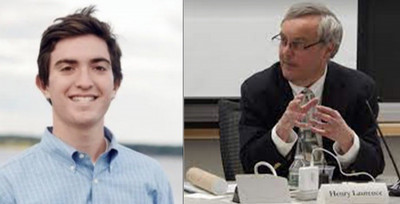Journalism Under Threat: Exploring the Decline of Independent Local News Media
By Tom PorterWhen it comes to Sam Borne’s summer research project, the topic is personal, says the rising sophomore and student journalist.

Under the supervision of Professor of Government and Asian Studies Henry Laurence, Borne is pursuing a fellowship that explores the causes and impact of the decline of local media across Maine and New Hampshire.
“The reason I'm doing this is because our democracy was based on the simple assumption that the people would have the information needed to make smart, educated, and informed decisions,” said Borne, “and when the information stops flowing, we have a problem.”
His project, funded by a Bowdoin Summer Research Award, focuses on two newspapers—New Hampshire’s Portsmouth Herald and The Times Record of Brunswick, Maine (whose coverage area includes the Bowdon College campus). Borne is examining how they have been impacted by the challenges of the twenty-first century as more and more people turn to the internet as a free news source that they believe they do not have to pay for, causing newspaper subscriptions, and accompanying advertising revenue, to fall.
“Since newspaper readership peaked in the early 2000s, it’s declined by around a quarter and is projected to be down by more than a third by 2025,” said Borne, who writes for The Bowdoin Orient and is considering journalism as a career.
“The newspapers that do remain are increasingly likely to be acquired by corporate entities, leading to a reduction in traditional fact-based and investigative journalism,” he explained, citing a 2011 Federal Communications Commission report looking at the changing media landscape.
“... in many communities,” said the FCC study, “we now face a shortage of local, professional, accountability reporting. This is likely to lead to the kinds of problems that are, not surprisingly, associated with a lack of accountability—more government waste, more local corruption, less effective schools, and other serious community problems.”
Borne’s research involves interviewing key stakeholders, gathering data (much of it by examining decades’ worth of microfilm records), poring over the minutes of town meetings, and looking through stockholder reports and investor calls from companies like Gannett, the media conglomerate that owns USA Today, as well as dozens of local news organizations across the nation.
“Local news reporting is in crisis,” said Laurence, whose most recent book looks at the politics of public broadcasting in the UK and Japan. “Scholars of political communications are increasingly studying both the causes of the collapse in revenues of reliable, nonpartisan journalism and its malign effects on local democracy and civil society. Sam’s excellently designed comparison of two different local newspapers fighting the same pressures is at the cutting edge of this research,” he added. “He’s on track to make a vital contribution to our understanding of a crucially important but underappreciated aspect of our fast-eroding democracy.”
The majority of scholarly research on this topic has tended to look at broad national trends and neglect specific regions like northern New England, said Borne, a shortfall he aims to address. “Without targeted research on individual regions,” he said, “scholars cannot determine if this national decline has occurred for the same reasons everywhere. In order to better understand this trend,” he added, “scholars must move past broad-based assumptions and collect quantifiable data.”
Growing up in a small town in New Hampshire, Borne said he saw this trend unfolding in front of him, witnessing the decline of his local paper after it was bought by a media conglomerate. “Consequently, its coverage of civic events decreased, and so did civic engagement, leading to a lack of accountability among our elected officials. To me this topic is personal.”